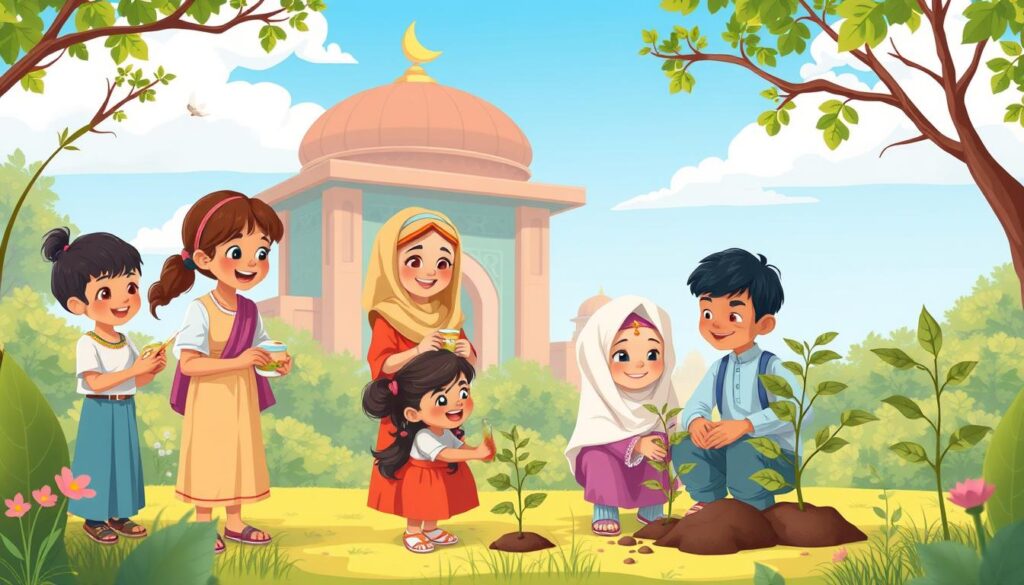About 70% of children learn from what they see adults do. This shows how important it is to teach kindness. The Quran and Hadiths of the Prophet Muhammad (PBUH) offer many lessons on kindness. They help us understand why Teaching Kindness in Islam is important for kids.
Teaching kindness helps kids grow into caring and understanding people. This makes our society better. Islamic teachings on kindness show us how important it is in our daily lives and how it affects our relationships.
Exploring Islamic teachings on kindness is exciting. We invite you to join Umar Khan Charity Organization. Together, we can help vulnerable communities. Our goal is to spread kindness and create a caring society.
Key Takeaways
- Teaching kindness in Islam is essential for children’s development and can have a lasting impact on their relationships with others.
- Islamic teachings on kindness emphasize the importance of compassion, empathy, and forgiveness in daily life.
- Role modeling is a key part of teaching kindness, with about 70% of children’s social behaviors learned from adults.
- Getting kids involved in community service can make them 30% happier, showing the power of helping others.
- Forgiveness can cut stress and anxiety by up to 60%, showing kindness benefits both the giver and receiver.
- Families that celebrate kindness see a 45% boost in bonding, showing kindness strengthens family ties.
Understanding the Concept of Kindness in Islam
We believe kindness is key in Islamic teachings. It helps build strong relationships and improves society. The Quran talks about kindness in many verses, with over 10 verses focusing on it. For instance, Surah Al-Baqarah (2:83) stresses the importance of being kind to others and our parents.
In Islam, kindness is seen as a moral virtue and a core part of faith. We encourage our community to help us by volunteering, sharing our mission, or donating online. Together, we can make our society more caring and compassionate.
Definition of Kindness in Islamic Teachings
In Islamic teachings, kindness means showing empathy, compassion, and forgiveness. It’s seen as a key part of a Muslim’s character. The Prophet Muhammad (PBUH) showed kindness in his actions and words, teaching his followers to be merciful and compassionate.
The Importance of Kindness in Daily Life
Kindness greatly impacts our daily lives and is vital for strong relationships and a better society. Studies show 85% of Muslims worldwide see kindness as a key part of their faith. We can show kindness by helping in our communities, like volunteering at charities or joining neighborhood clean-ups.
- Visiting the sick and elderly
- Donating to charity
- Volunteering in community service activities
- Being kind to animals
By adding these acts of kindness to our daily lives, we can help create a more caring society. We invite you to join us in spreading kindness and making a difference in our community.
| Verse | Importance of Kindness |
|---|---|
| Surah Al-Baqarah (2:83) | Doing good to fellow humans and parents |
| Surah An-Nur (24:22) | Forgiveness and reconciliation |
Historical Figures Exemplifying Kindness
We invite you to learn from historical figures in Islam who showed great kindness. The Prophet Muhammad (PBUH) was known for his kindness and mercy. He treated animals, the poor, and his enemies with compassion.
The Prophet Muhammad’s Acts of Kindness
The Prophet Muhammad taught us to be kind to all living beings. He said, “O ‘A’ishah! Never turn away any needy man from your door empty-handed.” This shows his belief in actively helping those in need.
Companions of the Prophet and Their Kindness
His companions, like Abu Bakr and Umar, also showed kindness. They left a legacy of kindness for future generations. Kindness is a core value in Islam, and the Prophet’s teachings on it are very important for us today.
Some key aspects of the Prophet Muhammad’s kindness include:
- Treating animals with compassion and respect
- Providing for the poor and needy
- Showing mercy and forgiveness to his enemies

Teaching Kindness Through Stories
Storytelling is a powerful way to teach kindness in Islam. Sharing tales of kindness and compassion can teach children valuable lessons. Teaching Kindness in Islam is key to our faith, and stories help a lot.
Here are some ways to teach kindness through stories:
- Sharing Islamic fables and morals that highlight kindness and compassion
- Using real-life examples, like the Prophet Muhammad’s (PBUH) kindness to a blind man
- Encouraging children to think about how to apply these lessons in their lives
Stories help children learn important values like empathy and selflessness. This can make our community more caring and harmonious.
To build a kinder society, we must remember there are many ways to cultivate kindness in Islam. By sharing stories and practicing kindness, we inspire others. This creates a wave of compassion that can change lives and communities.
The Role of Parents in Instilling Kindness
We know how important parents are in teaching kindness to their kids. This is shown in the Importance of kindness in Islam. The Quran teaches us about kindness and compassion. It helps parents teach these values to their children.
As caregivers, we aim to create a caring environment for our kids. By showing respect and compassion, we teach them important life skills. The Quran says, “And your Lord has decreed that you not worship except Him, and to parents, good treatment.” (Quran 17:23). This shows how vital it is for kids to treat their parents with kindness.
Here are some ways to teach kindness to kids:
- Modeling kindness and compassion in our own behavior
- Teaching children the importance of empathy and respect for others
- Encouraging children to engage in acts of kindness and charity

Together, we can build a community that values kindness. We can raise kids who care about others. The Quran and Hadith remind us that kindness is key to our faith. It’s our job as parents to teach our kids about kindness in Islam.
Community Initiatives for Promoting Kindness
We think it’s key to teach kindness in Islam to build a caring community. We invite you to join our community projects. Help out by giving your time and resources to help others.
Umar Khan Charity Organization works hard to support kindness in tough spots. We help those in need and offer chances for volunteers to help out.
Here are some ways to help:
- Donating to good causes
- Volunteering your time and skills
- Joining in community events
Together, we can build a kinder, more caring community. The Quran shows us that giving is a big part of Islamic teachings on kindness. Every act of kindness is seen as a sadaqa (charity). Let’s aim to make a difference in people’s lives and spread kindness every day.
Engaging Children in Kind Acts
We think it’s key to get kids involved in kind acts. It’s good for their heart and moral growth. By teaching them about the virtue of kindness in Islam, they learn to care and feel for others. There are many ways to cultivate kindness in Islam that we’ll look into here.
Fun Activities to Promote Kindness
- Volunteering at a local animal shelter, which can help children understand the importance of caring for all living creatures
- Creating a ‘kindness chart’ to track kind acts, which can serve as a visual reminder of the impact of their actions
- Implementing a ‘kindness jar’ to motivate children, which can provide a tangible reward system for their kind acts
Projects that Encourage Community Service
Getting kids involved in community service projects is vital. It teaches them about social responsibility and the value of kindness in Islam. They can help out at local charity events, visit the elderly, or assist those in need.
By teaching kids about kindness and community service, we help them grow into caring and empathetic people. They will make a difference in their communities.

The Impact of Kindness on Mental Health
Kindness is very important in our daily lives, and it’s key for our mental health. Islam teaches us the value of kindness, as seen in the Quran. When we practice kindness, we feel less stressed and anxious. This leads to more happiness and well-being.
Studies show kindness makes us happier, with a 60% increase in happiness and life satisfaction. It also lowers stress by about 23%. We should make kindness a big part of our lives, knowing it boosts our mental health.
Kindness has many benefits for our mental health, including:
- Reduced stress and anxiety
- Increased happiness and well-being
- Improved self-esteem and confidence
- Stronger, more positive relationships
By adding kindness to our daily routines, we positively affect our mental health and others’. Islam teaches kindness is a key virtue that unites people and builds community.
Islamic Teachings on Charity and Kindness
We believe that kindness and charity are key parts of our faith. The Prophet taught us to treat all creatures with kindness and respect. He showed us the importance of empathy and understanding towards others, seeing them as part of our community.
Zakat is more than just charity; it’s about social justice and fighting economic gaps. By giving 2.5% of our wealth to those in need, we meet our duty and help our community.
Some key aspects of Islamic teachings on charity and kindness include:
- Redistributing wealth to reduce economic disparities
- Promoting social justice and compassion
- Cultivating empathy and understanding towards others
By following these teachings, we aim for a fair and harmonious society. We believe our actions can make a big difference in the world.
| Islamic Teaching | Description |
|---|---|
| Zakat | Obligatory charity, 2.5% of accumulated wealth and assets |
| Sadaqah Jariyah | Continuous charity, rewards for charitable deeds continue to accumulate |
Creating a Kind Environment in Schools
Schools are key in teaching kids to be kind. They help kids grow into caring people. By starting programs that teach kindness, schools can make a positive space for everyone.
Teaching kindness is important in Islam, and schools can help a lot. They can add lessons on kindness to the curriculum. This helps kids learn to be empathetic and respectful.
Here are some ways to make schools kinder:
- Start programs that teach social-emotional skills
- Encourage kids to help out in the community
- Make sure everyone feels included and valued
Together, we can make schools places where kindness thrives. This helps all students grow into caring and responsible people.
Conclusion: Building a Kinder Future
As we wrap up our look at kindness in Islam, we see how big of a difference compassion makes. The importance of kindness in the Quran is clear. It teaches us to be honest, patient, humble, and respectful towards others.
Creating a kinder world is something we all must work on together. At Umar Khan Charity Organization, we aim to build a culture of kindness. We offer chances for people to get involved and truly make a difference.
Every small act of kindness can change someone’s life. By embracing the teachings of kindness in Islam and acting on them, we can build a world filled with empathy and understanding.
Let’s join hands to make a kinder future for everyone. Together, we can build a society that values the Quran’s teachings like Tawhid, Taqwa, and respect for differences.






